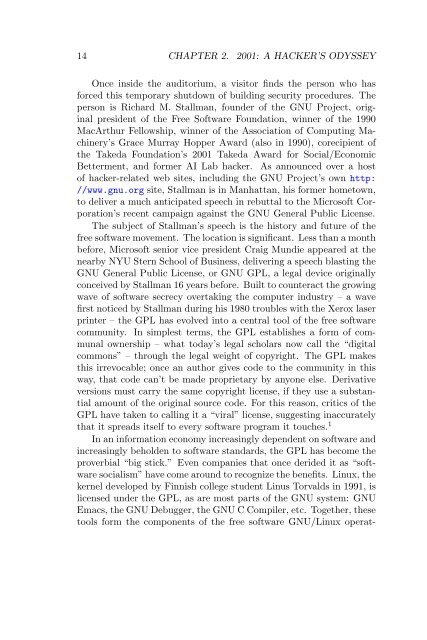Create successful ePaper yourself
Turn your PDF publications into a flip-book with our unique Google optimized e-Paper software.
14 CHAPTER 2. 2001: A HACKER’S ODYSSEY<br />
Once inside the auditorium, a visitor finds the person who has<br />
forced this temporary shutdown of building security procedures. The<br />
person is Richard M. Stallman, founder of the GNU Project, original<br />
president of the Free Software Foundation, winner of the 1990<br />
MacArthur Fellowship, winner of the Association of Computing Machinery’s<br />
Grace Murray Hopper Award (also in 1990), corecipient of<br />
the Takeda Foundation’s 2001 Takeda Award for Social/Economic<br />
Betterment, and former AI Lab hacker. As announced over a host<br />
of hacker-related web sites, including the GNU Project’s own http:<br />
//www.gnu.org site, Stallman is in Manhattan, his former hometown,<br />
to deliver a much anticipated speech in rebuttal to the Microsoft Corporation’s<br />
recent campaign against the GNU General Public License.<br />
The subject of Stallman’s speech is the history and future of the<br />
free software movement. The location is significant. Less than a month<br />
before, Microsoft senior vice president Craig Mundie appeared at the<br />
nearby NYU Stern School of Business, delivering a speech blasting the<br />
GNU General Public License, or GNU GPL, a legal device originally<br />
conceived by Stallman 16 years before. Built to counteract the growing<br />
wave of software secrecy overtaking the computer industry – a wave<br />
first noticed by Stallman during his 1980 troubles with the Xerox laser<br />
printer – the GPL has evolved into a central tool of the free software<br />
community. In simplest terms, the GPL establishes a form of communal<br />
ownership – what today’s legal scholars now call the “digital<br />
commons” – through the legal weight of copyright. The GPL makes<br />
this irrevocable; once an author gives code to the community in this<br />
way, that code can’t be made proprietary by anyone else. Derivative<br />
versions must carry the same copyright license, if they use a substantial<br />
amount of the original source code. For this reason, critics of the<br />
GPL have taken to calling it a “viral” license, suggesting inaccurately<br />
that it spreads itself to every software program it touches. 1<br />
In an information economy increasingly dependent on software and<br />
increasingly beholden to software standards, the GPL has become the<br />
proverbial “big stick.” Even companies that once derided it as “software<br />
socialism” have come around to recognize the benefits. Linux, the<br />
kernel developed by Finnish college student Linus Torvalds in 1991, is<br />
licensed under the GPL, as are most parts of the GNU system: GNU<br />
Emacs, the GNU Debugger, the GNU C Compiler, etc. Together, these<br />
tools form the components of the free software GNU/Linux operat-


